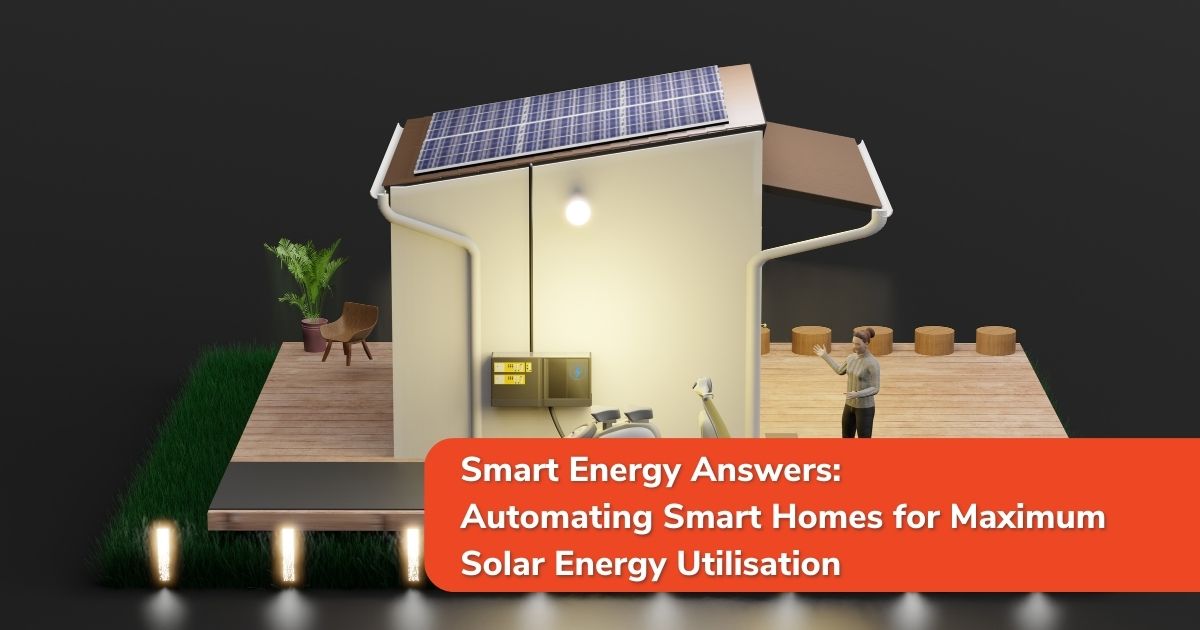Automating Smart Homes for Maximum Solar Energy Utilisation

Discover how to efficiently automate smart homes to make the most out of solar energy utilisation.
Significance of energy monitoring in optimising solar usage
Energy monitoring plays a crucial role in optimising solar usage in smart homes. By constantly tracking and analysing the energy consumption patterns, homeowners can gain valuable insights into their solar energy utilisation. This information allows them to make informed decisions and adjustments to maximise the efficiency of their solar energy systems. With energy monitoring, homeowners can identify areas where energy is being wasted or under-utilised, enabling them to take appropriate steps to optimise their solar usage.
Explanation of how smart energy monitors track solar usage
Smart energy monitors are sophisticated devices that track and measure the solar energy usage in smart homes. These monitors are connected to the solar energy system and provide real-time data on the amount of energy being generated and consumed. They use advanced algorithms to analyze the data and provide insights into the solar energy usage patterns. Smart energy monitors can track the energy generated by the solar panels, energy consumed by different appliances, and overall energy usage trends. This information helps homeowners understand how their solar energy system is performing and identify opportunities for optimization.
Identification of opportunities for optimising energy usage and efficiency
By monitoring and analyzing the energy usage data, homeowners can identify opportunities for optimizing energy usage and improving efficiency. They can identify appliances or devices that consume excessive energy and take steps to reduce their usage or replace them with more energy-efficient alternatives. Homeowners can also adjust their energy usage patterns based on the solar energy availability to make the most out of the free energy generated by their solar panels. By identifying and implementing these optimization opportunities, homeowners can significantly increase their solar energy utilization and reduce their reliance on grid power.
Monitoring household energy usage and appliance consumption
Smart energy monitoring systems enable homeowners to monitor their household energy usage and track the consumption of individual appliances. This information provides valuable insights into the energy consumption patterns and helps homeowners identify energy-intensive appliances or devices. By monitoring appliance consumption, homeowners can make informed decisions about their energy usage and identify opportunities for energy-saving measures. They can also identify malfunctioning appliances or devices that may be consuming excessive energy and take corrective actions.
Importance of interoperability and open communication standards
Interoperability and open communication standards are crucial for the efficient automation of smart homes for solar energy utilization. These standards ensure that different smart devices and systems can seamlessly communicate and exchange data. By adopting interoperable devices and systems, homeowners can integrate their smart energy monitoring systems with other smart devices, such as smart thermostats and smart lighting systems. This integration allows for better coordination and control of energy usage, leading to optimized solar energy utilization.
Adjusting energy settings and schedules from anywhere for optimal usage
One of the key benefits of smart energy monitoring systems is the ability to adjust energy settings and schedules from anywhere for optimal usage. Homeowners can remotely control their smart devices and appliances based on the solar energy availability and their energy usage preferences. For example, they can schedule their appliances to run during peak solar energy production hours, thereby maximizing the utilization of solar energy. This flexibility and control enable homeowners to make the most out of their solar energy systems and optimize their energy usage.
Empowering users to implement energy-saving measures for long-term benefits
Smart energy monitoring systems empower users to implement energy-saving measures for long-term benefits. By providing real-time energy usage data and insights, these systems enable homeowners to monitor their energy consumption and identify areas for improvement. Homeowners can make informed decisions about their energy usage and implement energy-saving measures, such as adjusting thermostat settings, using energy-efficient appliances, or installing energy-saving features. By adopting these measures, homeowners can not only maximize their solar energy utilization but also enjoy long-term energy cost savings and reduce their environmental impact.
Importance of historical data for evaluating system performance and identifying areas for improvement
Historical data plays a crucial role in evaluating the performance of the smart energy monitoring system and identifying areas for improvement. By analyzing historical energy usage data, homeowners can identify trends, patterns, and anomalies in their energy consumption. This information helps them evaluate the effectiveness of their solar energy system and identify areas where further optimization is required. Historical data also enables homeowners to track the impact of their energy-saving measures and make data-driven decisions for continuous improvement.
Compliance with data protection regulations and standards
Compliance with data protection regulations and standards is essential when implementing smart energy monitoring systems. Homeowners must ensure that their data is protected and handled in accordance with relevant privacy laws and regulations. This includes implementing robust security measures to safeguard the data collected by the monitoring system. By complying with data protection regulations and standards, homeowners can have peace of mind knowing that their energy usage data is secure and their privacy is protected.
Recap of the benefits and features of smart energy monitoring for solar usage and call to action
In summary, smart energy monitoring systems offer numerous benefits and features for optimizing solar usage in smart homes. They provide real-time energy usage data and insights, enable remote control of energy settings, empower users to implement energy-saving measures, and facilitate the evaluation of system performance.
By maximising solar energy utilisation, homeowners can reduce their reliance on grid power, save on energy costs, and contribute to a more sustainable future. Take the first step towards efficient solar energy utilization by implementing a smart energy monitoring system in your smart home today!
%20(1).png?width=265&height=96&name=www.smartenergyanswers.com.auhs-fshubfsSmart%20Energy%20Answers%20Logo%20(HIRES)%20(1).png)







.png?width=514&height=121&name=Tesla%20Powerwall%203%20(new).png)

